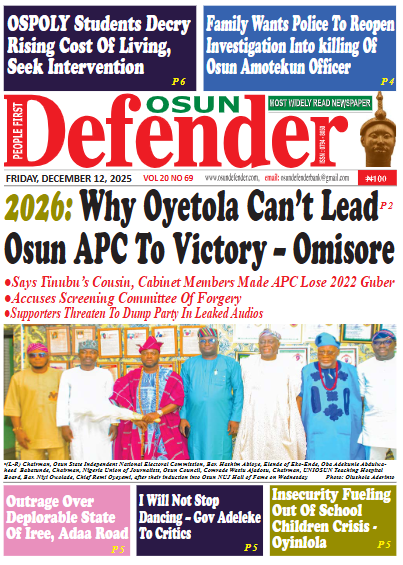GOOD Governance has become a mantra in development discuss globally. As complex as “book people” in management studies think the phrase is, for the common man it is a simple matter – good government.
Whereas experts say good governance has 8 characteristics, that “it is participatory, consensus-oriented, accountable, transparent, responsive, effective and efficient, equitable, inclusive and follows the rule of law,” Pope Francis provides a far simpler way for finding out if a government is good or not. He said “every man, every woman who has to take up the service of government must ask themselves two questions: ‘Do I love my people in order to serve them better? Am I humble and do I listen to everybody, to diverse opinions, in order to choose the best path?’ If you don’t ask those questions, your governance will not be good.” Pope Francis, of course, implies not the mere asking of the questions but answering them positively!
Good governance is the premium dividend of democracy. Every other good thing we have penchant for listing follows – infrastructure, security, economic boom, e.t.c. Newton Jibunoh says “The dividends of democracy are simply the benefits enjoyed by the masses who voted for the government in power.” It is expected to be “life, liberty and the pursuit of happiness.”
Good governance by government, though a constitutional duty, does not drop from heaven. It is the creation of good people. When a person goes to the Automated Teller Machine (ATM) to withdraw money, he definitely expects it to give him or her back the money he or she has there. You do not kneel down to thank it for doing so. Only a faulty ATM machine will give you money when you don’t have a dime there. Likewise, when you see citizens and communities thanking government and rolling out the drums for providing them with borehole water or tarred road, there is a fault with the beneficiary and the benefactor!
The fault, in the case of Nigeria (and most of Africa) is simply understood. Government all over the world run on taxing the productivity of their people. When government governs with tax payer’s money, the payers are emboldened to tax government to govern well. Having all but abolished genuine Federalism in Nigeria, no thanks to donkey years of military rule, governments over the decades are no longer dependent on taxes from the people to “govern” nor interested in their productivity, relying almost entirely on rent from sales of crude oil, a naturally existing resource in Nigeria. They simply collect the monthly sale proceeds, allocate the biggest share to the Federal Government and share the rest to the States and Local Governments – all of them believing it is nobody’s money but their own to freely dispense as they please. The outcome is that whatever those who “govern” do for the citizens from the money has to be followed with deep gratitude from the citizens.
By abandoning the exploration of all other resources (which are in abundance and the most important of which is human resource, the people themselves), productivity is at its lowest, accompanied by widespread suffering, hustling and criminality. How do you tax a citizenry whose productive potential and consequent earnings is at a woeful low, hardly sufficient for their survival?
Narendra Modi said “Good governance is not fire-fighting or crisis-management. Instead of opting for ad-hoc solutions, the need of the hour is to tackle the root cause of the problem.” In our case, therefore, there is no escaping the return to genuine federalism and the full productive engagement of the people; if any and all our problems must be solved. Modi said “People power must be combined with good governance to bring about real, deep and lasting change. This combination can achieve almost everything from eliminating corruption to ending malnutrition and illiteracy.”
For now that it is a NO for Good Governance in Nigeria, the duty of all genuine democrats is clearly cut for them: without restructuring back to genuine federalism and the full productive engagement of the populace, all ad-hoc solutions and fire-brigade efforts are in vain – for all problems, from cost of bread to security of lives and property.










